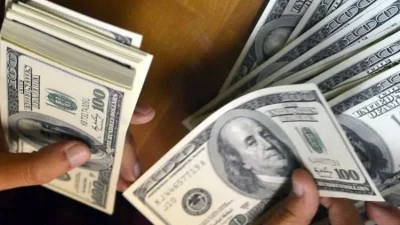Parallel Market Apprehensive Of Clampdown As More Nigerians Hoard Dollars
Some money changers on the streets of Lagos who spoke to LEADERSHIP, said they are not sure of what would come out of the clampdown on Abokifx.com which is one of their major sources of information.
By the close of business yesterday, the naira which opened at the parallel market at N575 to the dollar closed stronger at N566 to the greenback.
“Any dollar I get now, I sell it immediately, I don’t want to hold it for long because with this thing that happened with Abokifx, nobody knows what can happen next,” Usman, a moneychanger in the popular Alade Market in Lagos told LEADERSHIP.
The CBN governor, Godwin Emefiele, at a press briefing after the MPC meeting last week, had said directives had been given to close down the website of Abokifx.com, the most popular source of parallel market forex rates.
Consequently, Abokifx.com and other online platforms that broadcast foreign exchange rates in the parallel market, such as Naijabdcs.com and others have removed the exchange rates used by street money changers from their websites.
Abokifx, in a statement following the pronouncement by the CBN governor said it would be suspending the posting of parallel market rates which it said it sources from currency changers on the streets of Lagos.
The website on its official Twitter handle denied allegations of shady dealings in the foreign exchange market saying it does not participate in forex sales
Following the decision of the CBN to stop selling foreign exchange to bureau de change operators, the value of the naira has been on the decline, shedding more than N75. Analysts believe that the fall in the value of the currency is as a result of not just the activities of speculators but also ordinary citizens who are buying dollars as a store of value and investment.
According to analysts, many Nigerians are buying the dollar to hoard and sell much later when the naira has depreciated further. Head of Financial Institutions at Agusto&Co, Ayokunle Olubunmi, noted that a bulk of demand for forex is mainly from individuals buying it as a store of value and those seeking to buy Eurobonds.
Some individuals who spoke to LEADERSHIP confirmed that they are buying up dollars either with the intent of buying dollar denominated bonds or as a store of value. An accountant, Adeyemi Isreal told LEADERSHIP that having savings in naira no longer makes sense to him.
“With inflation at 17 per cent and the value of the naira keeps falling, I don’t see any reason to have naira savings anymore and there is no real investment that can preserve my funds in the country anymore.”
Another Nigerian, Jubril Ibrahim, a currency trader said he bought close to $3000 when it was N500 to the greenback and has now made N70 gain on each dollar. He is however not yet willing to sell saying “I am waiting for it to get to N600 before I sell.”


